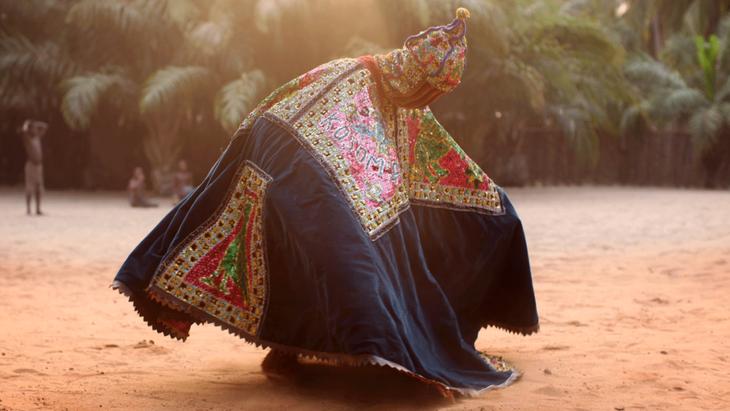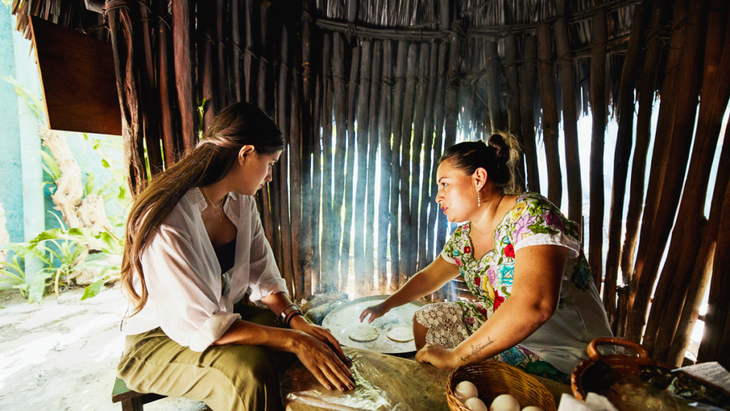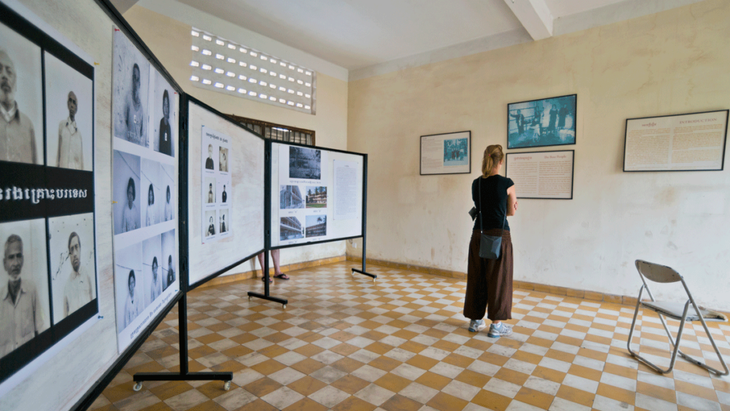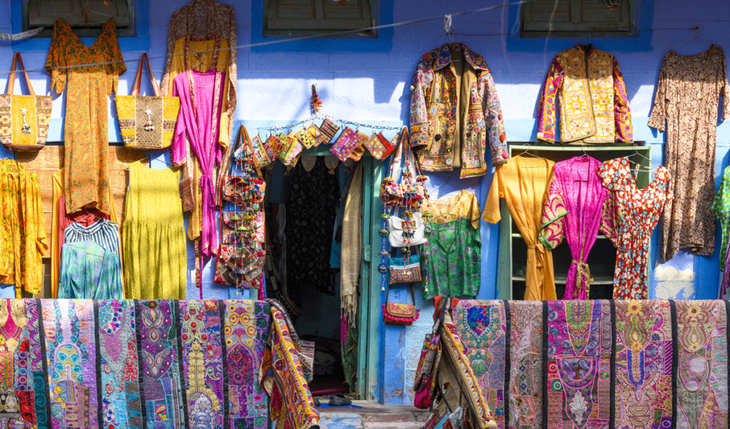Are You an Ethical Traveler?
This article originally appeared on Yoga Journal
In 2016, I led my first yoga retreat in Peru. Since I had already lived and worked abroad, traversing five continents, I considered myself to be pretty educated--savvy, even--when it came to embarking on global adventures. However, the responsibility of guiding a group in another culture revealed how much I had yet to learn. Building awareness around what it means to engage in ethical travel proved to be my biggest challenge and continues to be an area of learning in the ways that I, and so many of us, travel.
I learned--and am still learning--that we need to look beyond our anticipation and wanderlust and take seriously the responsibility of immersing ourselves in another culture. That includes curating our curiosity in a manner that is as respectful as possible to the people and the places we're visiting.
"Ethical travel is all about visiting places to learn and add value, rather than only to take," says Araba Ofori-Acquah, a Ghanaian-British writer and wellness coach who focuses on an African-centered approach to well-being. "As a stranger in a new community, it’s your job to minimize the negative impact of your presence on the place and its people, and maximize the positive impact."
This means being aware that everything we do has the potential to affect the people around us and the places we're visiting. It means wearing appropriate clothing to a sacred site and resisting the urge to take pictures of local children. Ofori-Acquah suggests that true ethical travel is being mindful to take the role of guests whenever we are in a new-to-us place. "This covers everything from making sure not to litter to having positive engagements with locals to spending your money with local businesses," she says.
Following are some of the lessons in ethical travel that I've learned so far.
How to Practice Ethical Travel
Learn About Your Destination
Gaining knowledge about the cultures you are about to experience is one of the most respectful things you can do when traveling. This begins long before you find yourself with uninterrupted time on the plane. It means practicing due diligence beforehand.
"Even if you’re going to a country just for a yoga retreat and don’t plan to explore further, it’s important you research the country, their culture, and their customs," says Ofori-Acquah. Everyone, including well-intentioned travelers and those volunteering their time and talents, will benefit from a more nuanced understanding of the culture.

Your preparation will provide a basic awareness of what you may witness and bring about a deeper understanding of your role as a passer-through. Your objectives when you engage in ethical travel need to include maintaining and showing respect for the dignity of the people, their culture, and their customs. "Whether you agree with the beliefs and customs of a country or not, if you plan to visit, you should be respectful of them rather than visiting with a colonial mindset of knowing ‘better’ than them," says Ofori-Acquah.
There are often unspoken rules, sensitivities, even laws in place that you need to be aware of before visiting a community. In some cultures, even simple gestures like extending your feet toward someone or touching someone's head may be considered disrespectful.
Understanding these can ensure you relate to others with respect. Also, learning a couple of key phrases or expressions in the local language, for example, indicates a willingness to extend effort toward communicating with others in their vernacular.
Know Your Reasons for Traveling
Whether your itinerary is for pleasure or engaging in any kind of seva (service or volunteer) trip, become curious about your reasons and intentions for traveling to a specific destination.
The simple act of asking yourself "why" engages svadhyaya, the yogic principle of self-study, which asks you to be more aware of yourself as an individual. Understanding the "why" behind your motivation and behavior can bring about clarity around your actions.
Turning a curious and even critical gaze on yourself can be an uncomfortable process, but a necessary one. You can then expand that curiosity and attentiveness outward to your interactions with others. This reminder to act with respect and modesty when engaging with the world can in turn challenge your existing perspectives and preconceived judgments.

Contribute Responsibly to the Local Economy
For many travel destinations, tourism is the largest source of employment and a primary contributor to the local economy. The survival of that community or country may be largely dependent on the number of visitors and how much money they spend.
This dynamic creates a disproportionate power structure. Engage with businesses that are locally owned, sustainable, or trying to offset their carbon footprint. Look for any opportunity to visit independently owned stores to learn and engage in symbiotic commerce.
Ofori-Acquah, who is based in Accra, Ghana, often witnesses problematic behavior from tourists who try to haggle prices. "While haggling is a part of the culture here, some tourists take it too far," she says. "The whole point of haggling is to create equity, ensuring that people pay what they can afford. So tourists visiting from Western countries should pay more for certain things than locals. But I’ve seen people push already low prices to rock bottom, which makes a material difference to the seller."
When you shop at a market, go on a tour, or get picked up at the airport, your exchanges contribute to people's livelihoods. The most respectful way to approach any kind of commerce or exchange is with a nuanced understanding of the culture and economy. This might not be something you can learn from a guide book or Google. Working with a local guide is one way to help ensure your interactions are respectful and responsible. You can hire a local guide to orchestrate interactions with local people and arrange cultural experiences, such as a tea ceremony or cooking class.

"I like taking travelers on a village walk where we visit homes in a village," says Jean Marie Twambaze, a Rwandan safari guide and wildlife photographer. "Travelers get to experience how Rwandans cook and what it takes to bring food on the table." In exchange, they contribute to families' income.
Refrain From Taking Photos Without Permission
Engage with those in another country or culture with the same respect you would anyone in your community. As a general rule, never take or share photos of anyone in another country, especially children, without their permission. (Think about someone taking a picture of your child and posting it online without permission. Chances are you would feel moral outrage.)
Also, be prepared for the unexpected. "Most tourists who come to Varanasi want to photograph sadhus (holy men)," says Uschi Gibson, a curator of transformative yogic adventures in northern and central India. He has been hosting yoga groups in India since 2010. “I always advise that if you want to take a photo with the sadhu, he is going to expect bakshish (a donation), since these holy people live off of offerings."
"It’s a transaction where each person wants something from the other,” says Gibson. “Taking the request for money personally is just a waste of time, and being offended by it is even more ridiculous, since whether this person is a real sadhu or not we may never know, and an offering of a dollar or two is minor."
Before you take a photo and share it online, ask yourself, Why do I want to post this? Did I ask permission from the person to share the photo? What perception will the photo convey about the place and the people? What effect do I intend to have on my followers?
Be Respectful of Recent History
If you are traveling to a region affected by a recent conflict and are curious to learn more, educate yourself about the history by reading up on it and exploring institutions dedicated to learning and remembrance, such as museums and memorials.

Certain topics are inappropriate to address with casual acquaintances. In some countries, there are laws against asking certain things related to ethnicity. It is vital to respect this. There are individuals who may be willing to share their knowledge. But allow any revealing of personal experience, whether by a travel guide or your host family, to take place organically.
Ponheary Ly is a survivor of the Khmer Rouge and the founder of the Ponheary Ly Foundation, a nonprofit that promotes and provides education in the Siem Reap province of Cambodia. Ly believes learning about her country's past is an integral part of experiencing it. "I like visitors to understand about our culture and history," she says. "Our history is complicated, but interesting and sad. People need to learn about it so that we will not let this [the Khmer Rouge] happen again."
Resist Saviorship Mentality
Participating in ethical travel through knowledge about your destination and a desire to be a "global citizen" should not be confused with subscribing to a "one-size-fits-all" way of life in which you think everyone is supposed to believe, value, desire, and access the same things in life. This oversimplification can incur more harm than good.
Within every culture, there are diverse faiths, socioeconomic positions, diets, sexual identities, and culturally unique experiences. The well-intended thinking that people from different corners of the world can--or should--unite around a single unifying message of equality and oneness often leads to cultural erasure.
Any preconceived notions about a place, its people, customs, culture, or way of life can contribute to "saviorship mentality," which is when a person attempts to rescue, liberate, or uplift others (specifically a BIPOC community) in order to feel good about themselves. This is different from seva, when you travel to assist with a needed and requested project.
"The most positive experiences we have with visitors to The Girls Home is when they engage with the project, understand the project, and continue supporting the project when they get home," says Rachel Collingwood, director of the Nicaraguan non-profit that provides a safe environment for girls who are taken out of unsafe homes. The organization welcomes volunteers to participate in projects such as after-school tutoring.
"But volunteers are so aghast at poverty and the lack of what they think are basic human rights, like air conditioning, they want to fix it by introducing unnecessary luxuries," she says. "[They] often make the mistake of thinking they can change the girls and introduce Western values."
The most helpful thing you can do is to resist the need to take immediate action. Turn to those who understand the situation and how to address it for guidance--and when you receive that guidance, follow it.
Twambaze once asked a traveler not to give handouts to children on the streets. He did not listen. "He threw a packet of sweets on the ground and kids ran for it. A vehicle behind us almost hit one of the kids."
It can be upsetting and heartbreaking to witness children begging, but in some places children who solicit handouts have been pulled out of school to help their families or enlisted by organized crime. Because it's impossible to know what's truly going on in each instance, it's best not to give money outright.

Remain Aware of What’s Appropriate
"Not every aspect of a people's culture is for your consumption, even if it actually is on sale," says Ofori-Acquah. What might seem like a lovely and inexpensive purchase might be clothing or jewelry traditionally reserved for specific ceremonies, which attaches significance and reverence to the object. Doing your homework prior to traveling affords you an understanding of what clothing and jewelry the locals wear and its significance. When in doubt, ask before you buy.
"Do your research and ask questions before deciding, for example, to get box braids or wear waist beads if it’s not your culture," she says, warning against participating in cultural appropriation.
Another common mistake tourists make is dressing in a manner that is considered inappropriate and disrespectful, according to Imane Achouqua, a manager and tour operator of a riad, or a house turned boutique hotel constructed around a courtyard or garden, in Marrakech, Morocco. For example, the yoga clothes you're accustomed to wearing may not be appropriate for day-to-day wear outside of practice. Or you may need to cover your shoulders, head, or knees. Pack an array of modest clothing when traveling to most countries.
As you research your next trip--be it a yoga retreat or vacation--you want to ensure your information is from a credible source, and that your tour operator, accommodation provider, or other travel service has done their due diligence as well. They can offer resources and information so you know what to expect and what to pack.
Allow Your Experience to Be What It Is
It's understandable that you want your trip to run smoothly. Remaining open to the experience and enlisting a "go with the flow" attitude is essential. Sometimes delays or disappointments happen. People and communities operate at different paces and speeds than what you're accustomed. Transportation could be delayed or hot water might be switched off. Consider adapting and adjusting to be part of the adventure.
Gibson believes people need to be open to being challenged when visiting a new place. "International travel is a privilege, and somewhere along the way, it’s often forgotten how incredibly lucky we are to visit locations far away from home," says Gibson.
"Being that my home is a very spiritual destination, and the people I host are yogis, I like to remind our guests that India is not a place you visit to feel like you are at home. Your comfort zone will be stretched, and you’ll face yourself in what I like to call, 'Is your practice working?'” she says.
"Any travel is a great reflection for us, but showing up as we are, being willing to slow down and observe, gives us the capacity to take in more," says Gibson. "Travel allows us to gain such wonderful perspective on ourselves and our world."
Ultimately, ethical travel means creating an environment of connection that includes carrying yourself with some measure of humility and an open mind.
About Our Contributor
While embracing New York City's fast-paced yoga culture, Jordan Ashley (MA Human Rights and PhD candidate) recognized a need for a more service-based practice, a need for experiences which give perspective to the self through selflessness. Drawing on her experience traveling and teaching yoga, she created Souljourn Yoga Foundation, a US 501(c)3 non-profit that creates transformational yoga retreats and teacher training programs to raise awareness and funds for young women's education around the world. Jordan is an activist, writer, yoga teacher, and Tedx speaker whose work has been featured by Forbes, the Los Angeles Times, Marie Claire UK, and more. View upcoming Souljourn Yoga retreats at https://www.souljournyoga.com/retreats.
For exclusive access to all of our fitness, gear, adventure, and travel stories, plus discounts on trips, events, and gear, sign up for Outside+ today.

